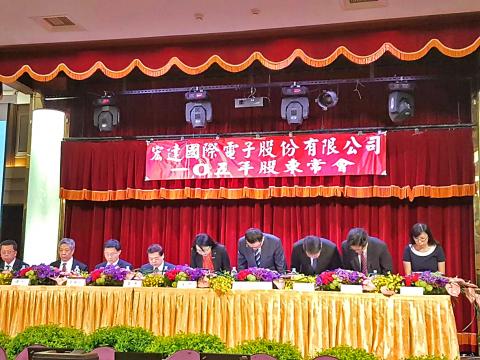HTC Corp (宏達電) chairwoman and chief executive officer Cher Wang (王雪紅) yesterday apologized to shareholders for the company’s disappointing performance in the past year, but avoided answering shareholders’ questions on when HTC would swing back to profit.
“I understand that an apology would not solve the issues, but I hope the shareholders have faith in HTC, as we have built a solid foundation for success through our efforts in VR [virtual reality] business in the past year,” Wang said at the company’s annual general meeting in Taoyuan.
The smartphone company reported a net loss of NT$15.53 billion (US$477.85 million), or NT$18.79 per share, for last year, compared with a net income of NT$2.35 billion, or NT$1.8 per share, in the previous year.

Photo: CNA
Wang said it is not difficult to make HTC’s VR business profitable, but the company has to seek strategic partners and invest more in contents and platforms in a bid to build a VR ecosystem and secure a leading position in the emerging market.
She said the company in April launched a US$100 million accelerator program for VR start-ups in Taipei, Beijing and San Francisco.
HTC plans to expand the program to speed up the technology’s development and increase contents for its VR headset Vive, she added.
Given that the VR business would play the most important role in HTC’s growth in the next 10 years, the company has established a wholly owned VR subsidiary, Wang said.
Chang Chia-lin (張嘉臨), head of HTC’s global sales division, said HTC might allow future strategic partners to invest “a small amount” of stakes in the subsidiary, but ensured that it would have no affect on the interests of HTC shareholders in the VR subsidiary, as HTC is to remain the largest shareholder.
Chang said the company has developed several new business models in the VR ecosystem for long-term growth, but he declined to elaborate on the details of the business models due to increasing international competition.
In response to shareholders’ concerns regarding HTC’s troubled smartphone business, Chang said the sales performance of this year’s flagship model M10 is much better than the last year’s M9.
Chang said sales of M9 last year were much lower than the company’s expectations, causing problems and dragging HTC’s overall performance from the second quarter of last year to the first quarter of this year.
Through several quarters of efforts, HTC has lowered 40 percent of its operational costs in the second quarter of this year, compared with the same period last year, he said.
With improvement in user experience and inventory management, M10 has generated profits at retail channels since it was launched at the beginning of this quarter, Chang said.
The robust demand for M10 has also helped drive up demand for HTC’s other smartphones by about 20 percent, he added.
HTC shares dropped 1.73 percent to close at NT$90.8 in Taipei trading yesterday.

In Italy’s storied gold-making hubs, jewelers are reworking their designs to trim gold content as they race to blunt the effect of record prices and appeal to shoppers watching their budgets. Gold prices hit a record high on Thursday, surging near US$5,600 an ounce, more than double a year ago as geopolitical concerns and jitters over trade pushed investors toward the safe-haven asset. The rally is putting undue pressure on small artisans as they face mounting demands from customers, including international brands, to produce cheaper items, from signature pieces to wedding rings, according to interviews with four independent jewelers in Italy’s main

Japanese Prime Minister Sanae Takaichi has talked up the benefits of a weaker yen in a campaign speech, adopting a tone at odds with her finance ministry, which has refused to rule out any options to counter excessive foreign exchange volatility. Takaichi later softened her stance, saying she did not have a preference for the yen’s direction. “People say the weak yen is bad right now, but for export industries, it’s a major opportunity,” Takaichi said on Saturday at a rally for Liberal Democratic Party candidate Daishiro Yamagiwa in Kanagawa Prefecture ahead of a snap election on Sunday. “Whether it’s selling food or

CONCERNS: Tech companies investing in AI businesses that purchase their products have raised questions among investors that they are artificially propping up demand Nvidia Corp chief executive officer Jensen Huang (黃仁勳) on Saturday said that the company would be participating in OpenAI’s latest funding round, describing it as potentially “the largest investment we’ve ever made.” “We will invest a great deal of money,” Huang told reporters while visiting Taipei. “I believe in OpenAI. The work that they do is incredible. They’re one of the most consequential companies of our time.” Huang did not say exactly how much Nvidia might contribute, but described the investment as “huge.” “Let Sam announce how much he’s going to raise — it’s for him to decide,” Huang said, referring to OpenAI

The global server market is expected to grow 12.8 percent annually this year, with artificial intelligence (AI) servers projected to account for 16.5 percent, driven by continued investment in AI infrastructure by major cloud service providers (CSPs), market researcher TrendForce Corp (集邦科技) said yesterday. Global AI server shipments this year are expected to increase 28 percent year-on-year to more than 2.7 million units, driven by sustained demand from CSPs and government sovereign cloud projects, TrendForce analyst Frank Kung (龔明德) told the Taipei Times. Demand for GPU-based AI servers, including Nvidia Corp’s GB and Vera Rubin rack systems, is expected to remain high,